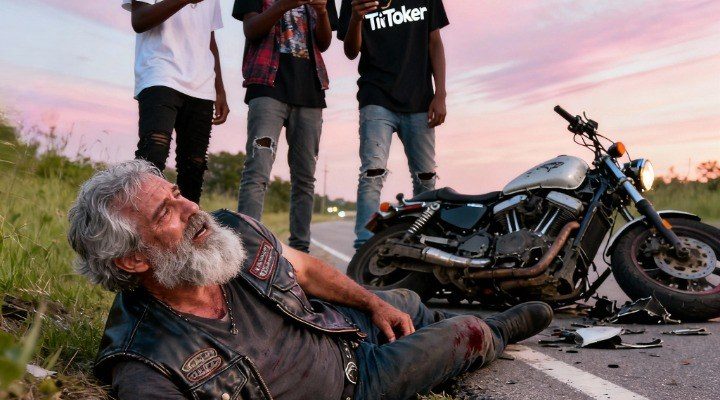Three teenagers hit a motorcyclist and, instead of dialing for help, aimed their phones at him like it was a show. They laughed while a 64-year-old grandfather clawed across the pavement toward the mangled remains of his Harley, his left leg folded the wrong way, blood spreading under his helmet.
“Look at the old guy trying to rescue his bike!” one of them jeered, zooming in.
“This is gonna blow up online!” another said.
Then I noticed his vest—the same back patch, service pins, and “Vietnam Veteran” rocker my own father wore until the day we buried him. Something in me broke.
“Call 911!” I shouted as I jumped from my car.
The tallest kid, maybe seventeen, swung his camera toward me. “Relax, lady. Somebody else will. This is content gold.”
Content. Not a human life—content.
I knelt in broken glass and oil beside the rider. His breathing was shallow but steady. Through the cracked visor I saw fear and pain but also awareness.
“I’m here,” I told him, already dialing. “Help’s on the way.”
“My…bike…” he whispered, reaching toward the twisted frame.
“Don’t move. Please.” Bone pushed through torn denim. “What’s your name?”
“Tom… Tom Sanders…”
Behind me, the boys narrated like sportscasters. “Dude, his leg’s backwards—get a close-up!”
While the dispatcher took our location, one of them actually kicked the wreck, laughing as parts skittered across the asphalt.
“Stop!” I snapped. “What is wrong with you?”
“Relax. It’s totaled,” he smirked. “Old guys shouldn’t ride anyway.”
Tom’s gloved hand found mine and squeezed. “My wife… please call my wife…”
The operator said the ambulance was about fifteen minutes out—far too long when someone’s bleeding. “What’s her number?” I asked. He rasped it; I repeated it back to keep him awake.
Then I heard one kid say the quiet part out loud: “Bro, cut the part where we hit him. Keep the clip where he’s crawling.”
They’d hit him—and were editing the proof.
“You hit him?” I asked, voice flat.
“He came outta nowhere,” the tall one shrugged. “Not our fault he can’t ride.”
“You hit him and didn’t call for help?”
“Why would we? Our insurance would spike. He’s just biker trash.”
I looked at Tom—husband, father, granddad, veteran—bleeding on hot pavement while his attackers called him trash.
“Keep filming,” I said evenly. “Please. Film everything.”
They laughed, thinking I’d given up. I wasn’t. I was building a record.
Sirens finally howled closer. A passerby in a shop uniform sprinted over and planted himself between the kids and Tom. Another driver brought a blanket. Someone set flares. Strangers did what the boys should have done.
Paramedics knelt beside us. “How long has he been down?” one asked.
“At least twenty minutes,” I said loudly enough for the boys to hear. “These three were here the whole time—filming.”
The medic’s jaw tightened. “You were here and didn’t call?”
“It’s a free country,” the tall one muttered. “Not illegal to film.”
Duty pulled the medics back to Tom. As they stabilized his leg and prepped a tourniquet, he squeezed my hand. “Tell my brothers… the club…”
“I will,” I promised, not sure who he meant, only that it mattered.
The boys drifted to a new BMW with dealer plates and drove off. I memorized the tag and followed at a distance to a Starbucks a few blocks away, where they laughed over laptops, cutting music to their clip and slapping laughing emojis over a man’s suffering.
I called the police with the plate number and reported a hit-and-run. Then I searched for local motorcycle clubs. The first two calls went to voicemail. The third picked up.
“Iron Brotherhood MC, this is Bear.”
“You don’t know me,” I said, shaking with anger, “but one of your brothers was just hit and left in the road while three kids filmed him. He told me to ‘tell the club.’ His name is Tom Sanders—Vietnam vet patches, black Harley.”
“Tommy?” Bear’s voice dropped. “Where?”
I gave the crash location and the hospital. Then, hesitating, “The kids who hit him are at the Third Street Starbucks—right now—posting the video.”
There was a long, cold silence. “They’re posting our brother dying?”
“Yes.”
“We’ll cover the hospital. Third Street Starbucks?” His tone went flat. “We’re just getting coffee.”
Twenty minutes later, forty-plus bikes rolled into that parking lot. The teenagers looked up from the window as leather vests filed in, ordered drinks, and took every seat around them. No threats. No words. Just a wall of eyes.
After five tense minutes, the boys tried to bolt. Bear—huge, calm—stood and blocked the doorway.
“I believe you’ve got some footage that belongs to us,” he said, polite as a funeral director.
“It’s a free coun—”
“It is,” Bear agreed. “Which means I’m free to share this hit-and-run report that matches your car, time, and place.”
Color drained from their faces.
“Delete it,” Bear said softly. “From your phones, your cloud, your posts. Do it now, in front of us. Or the next thing trending is a police press conference with your names on it.”
“It wasn’t attempted murder—it was an accident!”
“An accident you fled while you filmed,” Bear replied. “Start deleting.”
They complied, hands shaking. What they didn’t know: a younger member, Tech, had already screen-recorded their uploads. Evidence secured.
“Now email yourselves—and me—a full account,” Bear added. “How you hit him. Why you didn’t call. How you laughed. All of it.”
They typed. Sent. Then Bear stepped aside. “If Tom doesn’t make a full recovery, we’ll see you again—at your trial.”
They fled.
Bear hugged me like family. “You saved him,” he said. “Those punks would’ve watched him die for views.”
“How is he?”
“Alive. Leg’s a mess. Broken ribs. Internal bleeding. But alive—thanks to you.”
It should’ve ended there. But the boys had cloud backups. Someone leaked the uncut video—including the impact and their jokes. It went viral the wrong way. Colleges rescinded offers. Family businesses tanked under public fury. The tall one’s dad, a well-known attorney, staged a press conference to distance himself from his son.
Tom survived after six surgeries and months of rehab. The Iron Brotherhood covered bills, ran fundraisers, and the town rallied around a man many had once dismissed as “just a biker.”
Prosecutors charged the boys with hit-and-run, failure to render aid, and reckless endangerment. Their own footage was the star witness. Each got two years—likely serving less.
At sentencing, Tom stood with a cane and faced them. “You saw leather and thought I didn’t matter,” he said quietly. “I’m a father of three, grandfather of seven. Married forty-one years. Two tours in Vietnam. You nearly took all that for a clip you could caption.”
They mumbled apologies. He nodded once. “I forgive you,” he said. “Not for you—for me. Hate’s heavy. But forgiveness doesn’t erase what you did. Live better.”
A year later, Tom was back in the wind—on a trike adapted for his injuries. His first ride was to a high school where he now speaks about rider safety and basic decency. He always ends the same way: “That biker you pass on the road? He’s someone’s whole world. Treat him like it.”
The court ordered the boys to attend one of his talks. Afterward, the tall one approached. “I volunteer in the trauma unit now,” he said. “I’m trying to be better.”
“Good,” Tom said. “Keep at it. Maybe one day you’ll save a life instead of filming one slip away.”
Bear leaned over. “You’re a bigger man than me. I’d still want to knock them into next week.”
“Maybe once I would’ve,” Tom said, climbing onto his trike. “But when you think you’re dying, you don’t think about revenge. You think about who you love and the rides you still want to take. That’s the road I’m staying on.”
He rolled out, his club pacing him, slow and steady. They ride his speed now—that’s what brothers do.
As for the boys, word is the tall one became an EMT. The other two log hours at a motorcycle safety nonprofit. Punishment stung, but maybe Tom’s mercy did what punishment alone can’t: turn three careless kids into people who understand what a life is worth.
I still hear that day—the scraping, the labored breaths, the ugly laughter. And I still hear what Bear told me later: “You gave us the chance to show the world who we are. Not thugs. Family.”
Leather and patches don’t make you less human. They mark a brotherhood that won’t let one of its own die alone by the side of the road. Tom Sanders is proof. So is what happened when three teenagers forgot that the man under that vest was a person.



